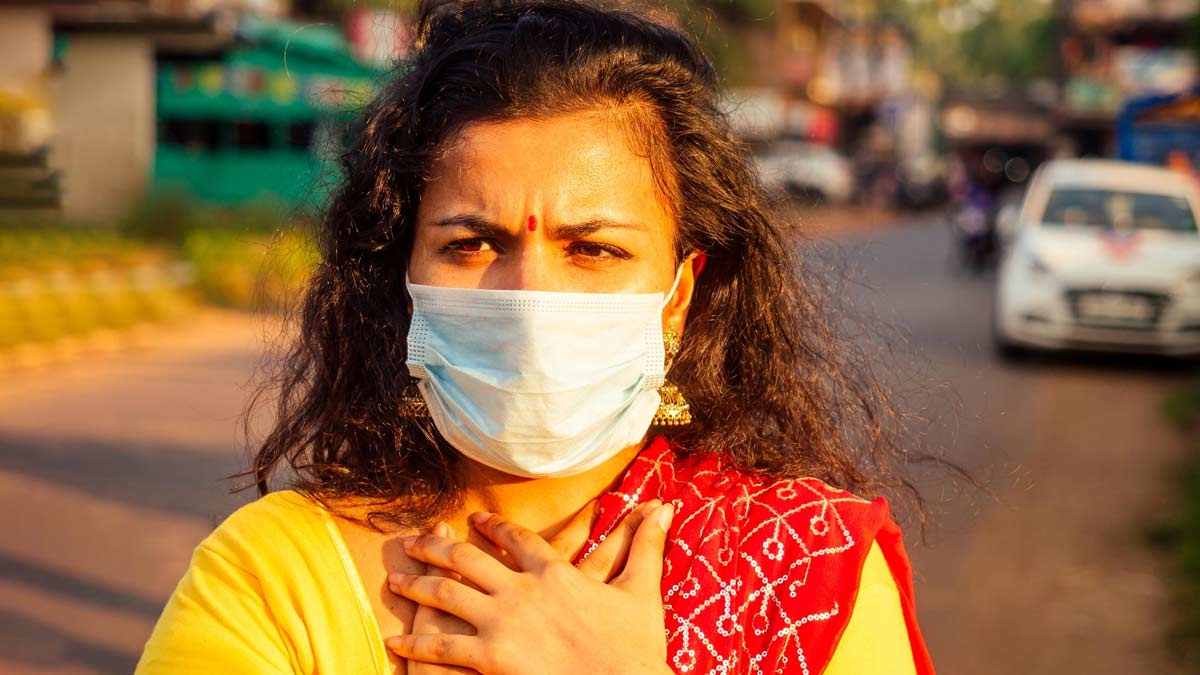
The air quality in many Indian cities deteriorates each year in the months of October and November, with many of them falling into the "very poor" category. These days, smog persists in the skies over several cities, including Delhi-NCR, and breathing this air can be extremely harmful to your health. It may influence not just your fertility but also the health of your organs.
We spoke with Dr. (Prof) Vinita Das, an obstetrician-gynaecologist, consultant, and advisor at Birla Fertility & IVF, as well as Dr. Piyush Goel, a pulmonologist at Manipal Hospitals, to learn more about this.

According to Dr Goel, “Pollution is basically a combination of various harmful gases like sulphur dioxide, and carbon monoxide along with dust, and smoke that contains various harmful chemicals. Most of these are carcinogenic along with water vapours resulting in the formation of particulate matter which we call PM 2.5 and PM 10. This in large numbers causes Pollution. This 2.5, 10 is the diameter of these particles in microns which is more than 20 times less than the diameter of a single hair. Now, these small pollutants when inhaled can go deep inside the lung which is into alveoli where gas exchange also takes place which is a release of co2 and o2 uptake into the blood. These particles can enter into the blood, and can go into every part of the body causing blockage of many small vessels of the brain leading to stroke, heart leading to heart attack and can also lead to infertility as blood supply can be affected for every organ of the body.”
Don't miss: How Does Smoking Impact Ovulation? Expert Explains
The problem of infertility is triggered due to pollution because these pollutants cause blockage in the small blood vessels that cause erectile dysfunction and low sperm count. It affects the entire mechanism of blood supply in men as well as in women, which makes it difficult for them to conceive.
Even if a woman is able to conceive, in many cases, the baby is not able to get the necessary nutrients via blood, which can be a risk. Just like smoking, pollution can also cause infertility and affect the entire reproductive function.

Dr (Prof) Das said, “Air pollution is involved in many pathologies, affecting numerous physiological functions, including reproduction. For decades, a causal relationship has been suspected between air pollution and some human health problems including fertility issues. Particulate matter (PM) having heavy metals like Copper, Lead, Zinc, etc. and ground-level ozone (O3), benzo (a) pyrene (BaP) (an indicator for polycyclic aromatic hydrocarbons (PAHs)) and nitrogen dioxide (NO2) are most problematic pollutants. The main sources of these pollutants are transport and industry. Air pollution has a negative impact on both male and female gametogenesis. These impacts not only influence the number of gametes but also their quality on a genetic and epigenetic level. These impacts also alter embryo development. ”
She added, “The mechanism underlying the effect of air pollutants on female fertility is still a matter of debate. In natural conception, reduced fecundability was associated with solvents and SO2 in different studies. The higher abortion rate was associated with traffic pollutants.”
The effect of air pollutants on male fertility and spermatogenesis has also been investigated in various studies. Increased sperm DNA fragmentation was associated with exposure to elevated air pollution. The largest study, conducted by Hammoud et al., reported that PM2.5 exposure negatively correlated with sperm morphology and motility. The negative effect of particulate matter was confirmed in a recent prospective cohort study that identified a significant association between PM10 and PM2.5 and sperm chromosomal abnormalities.
In conclusion, there is a close association between male and female infertility and air pollution. However, more robust data is required before any definitive conclusion can be reached.
Don't miss: Air Pollution Affects Women More Than Men: Study Suggests
Dr Goel said that inhaling such air can cause inflammation of the airways, leading to the narrowing of airways causing asthma attacks, and COPD exacerbation. Also, these particles can cause damage to alveoli, which are balloon-like delicate structures leading to damage resulting in a lack of effective gas exchange resulting in increased co2 levels and decreased o2 levels in the blood. In children, recurrent chest infections because of pollution can lead to hampering lung growth, resulting in making them more prone to lung disease in the future.
Today, on November 14, air quality in Delhi remained in the 'very poor' category with the Air Quality Index (AQI) at 309.
Air Quality Index (AQI) between zero and 50 is considered "good", 51 and 100 is considered "satisfactory", 101 to 200 is considered "moderate", 201 to 300 is "poor", between 301 and 400 is "very poor", and 401 and 500 is "severe".
For more such stories, stay tuned to HerZindagi.
Also watch this video
Herzindagi video
Our aim is to provide accurate, safe and expert verified information through our articles and social media handles. The remedies, advice and tips mentioned here are for general information only. Please consult your expert before trying any kind of health, beauty, life hacks or astrology related tips. For any feedback or complaint, contact us at [email protected].